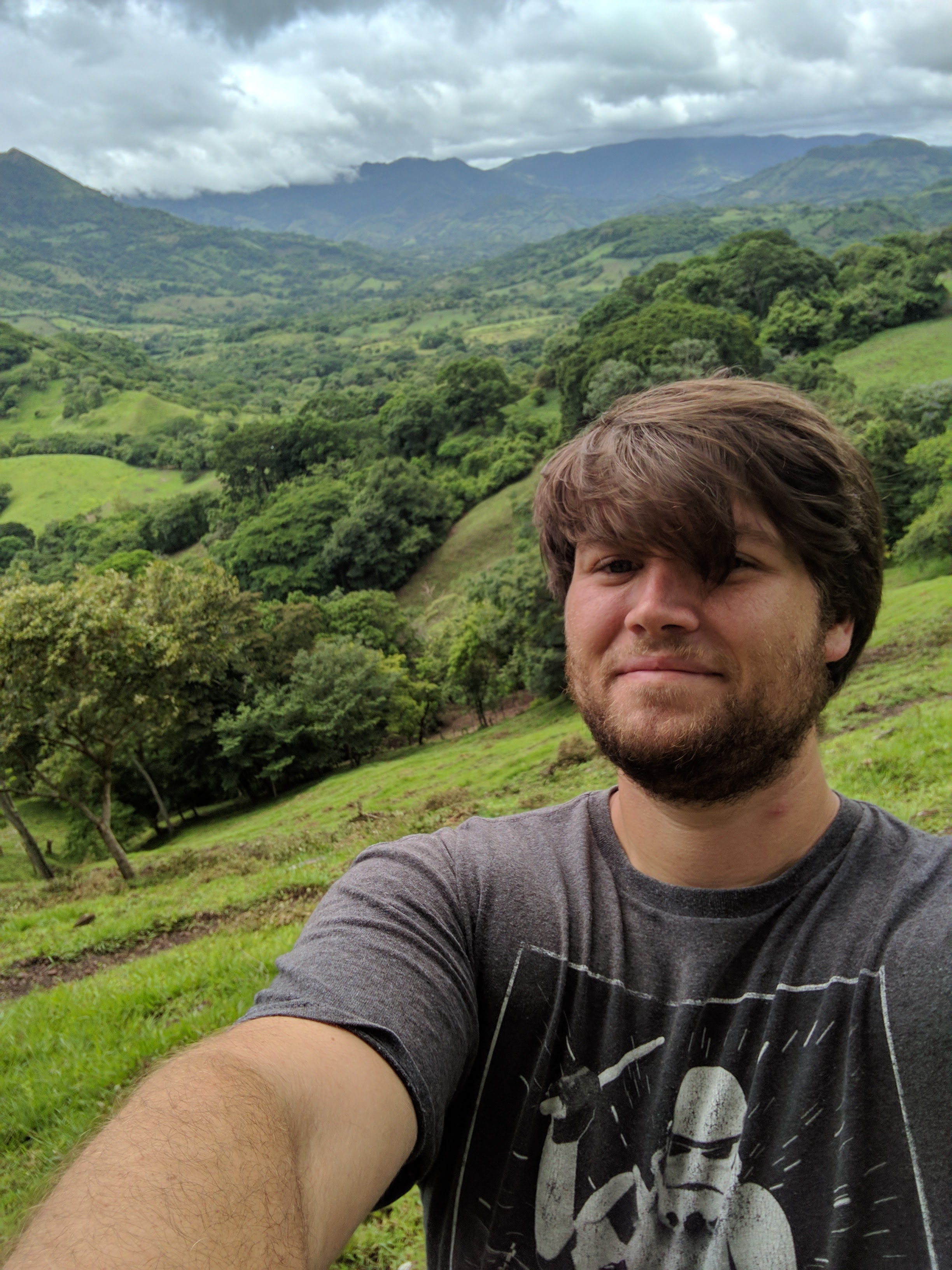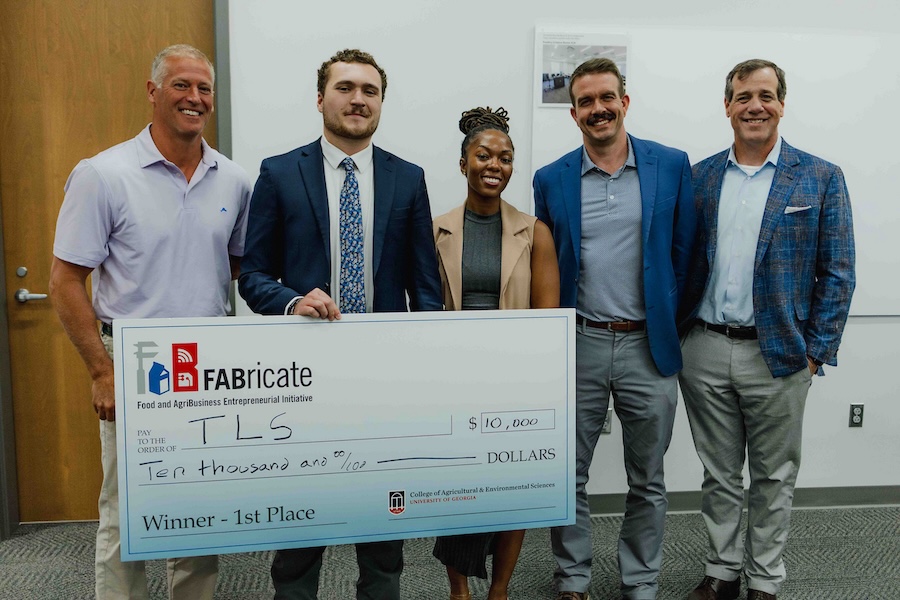Sean Posey didn’t see how agricultural economics would feed his love of math, but a decade into his grad school journey, he’s using those skills and interests to help improve farming practices in Africa. From information communication technologies to gender roles in information-sharing and incentivization programs that will improve groundnut health, Posey has been focused on improving agricultural practices and public safety for the past four years.
At the University of Georgia completing his Ph.D., Posey is working on a research project led by professor Nick Magnan through the Peanut Innovation Lab to find ways to improve the peanut value chain in Ghana, where groundnut is an important crop but suffers from aflatoxin contamination.
Agricultural economics was not Posey’s primary interest. When attending the University of Florida, before deciding to earn a degree in food and resource economics, Posey was fascinated by the idea of working with jets and rockets. However, after taking an economics course, he discovered a new enthusiasm, one that led him out of aerospace engineering and to mathematical models that can predict human behavior.
In pursuit of his new passion, Posey applied to the master’s program at Michigan State University where he had a connection to the International Center for Tropical Agriculture (CIAT) based out of Cali, Columbia.
In 2017 Posey was accepted to the internship with CIAT where he worked extensively with the Feed the Future Innovation Lab for Legumes. Coincidentally, Posey was unaware that there was an Innovation Lab at the University of Georgia when submitting his application.
“I always thought that was funny,” he said, “since peanuts are legumes. I always considered myself working with the peanut innovation lab in a way.”
Right before coming to UGA and taking on his second project within the Feed the Future initiative, Posey worked in Ethiopia for a young NGO called Precision Agriculture for Development (PAD) started by Michael Kramer and Sean Cole out of Harvard University.
While working for PAD, Posey focused on information communication technologies in development, assisting with a phone-calling program farmers in Ethiopia use to get answers to questions about planting, tilling the land, crops, prices, weather, etc. He analyzed the calls and identified patterns in how people used the system, looking for ways to improve the program.
With the Peanut Innovation Lab, Posey is working on two research questions.
The first is looking at the role gender plays in information sharing networks between spouses in Ghana. The original aim was to start field work in January, but due to the nature of the project and the effects of the global pandemic, Posey is having to reformat his proposal and await reconfirmation from the IRB.
He discovered how little he knew about the gender studies while working alongside a peer who focused on women’s empowerment and intimate partner violence and was motivated to take a more in-depth look.
“After more research I realized that there was a gap between men and women, and even in husbands and wives, in what they know and how they act which is still unexplained. It got me thinking, we focus so much on trying to get people to adopt technology through these information networks, yet we don’t know whether or not husbands and wives even tell each other about these new technologies,” he said.
When men are trained to adopt new technologies, do they share that knowledge with their wives and, if they do, how well do their wives learn?
Posey hopes to find out, with an experiment in Ghana, testing spouses' ability to complete an activity called the Tower of Hanoi in 15 moves. The game is easy to understand, but, unless the player has been told how to play, it’s difficult to complete in the minimum number of moves.
One spouse will be randomly selected to receive step-by-step instructions on how to play. Those who are selected will play first and their uniformed spouse will play the next day, allowing 24 hours for the couples to share information about the game.
“From this experiment, we should be able to see if husbands transmit better than their wives, if wives transmit better to their husbands, or if neither of them do,” Posey said.
The knowledge-sharing experiment is part of a long-term and more complicated project to provide incentives for groundnut farmers to control the amount of aflatoxin in their crop.
Aflatoxins are the by-products of molds that affect crops like groundnut and maize, and are exacerbated by drought stress or poor storage. Since they are invisible and tasteless, farmers have little motivation to take the extra steps necessary to minimize their presence within their crop.
The project is looking at ways to give farmers a financial incentive to invest in practices proven to prevent aflatoxin accumulation.
“The reason why this project hasn’t gotten very far is, well, it’s because it’s really difficult ... there are communication errors and trust issues across the board. Aggregators don’t trust processors, processors don’t trust aggregators, and farmers don’t trust anybody,” he said.
Often, when a processor offers an aggregator a higher price for low-aflatoxin nuts, the quality of the crop declines after the first purchase. This results in a lack of trust which motivates processors to buy cheaper groundnuts elsewhere, leaving aggregators without a buyer and farmers without an aggregator.
Pandemic made travel impossible and delayed his work, but Posey is glad precautions are in place to protect participants and researchers alike.
“I’m glad they’re being as strict as they are because it means they’re keeping researchers like myself safer. A lot of the time you get excited and don’t necessarily consider your own safety, you just want to get out there and get it done, but what’s most important is that they make sure participants are safe which is always something a researcher should keep in mind,” he said.
At the moment, Posey is still deciding where his Ph.D. in agricultural economics will take him. He enjoyed his time working with PAD and wishes to work with another NGO once his time with the Peanut Innovation Lab comes to a close. His passion for information networks and ICT and development will lead the way, as long as he gets to continue his research in agricultural development, Posey will be happy.






.jpg)
